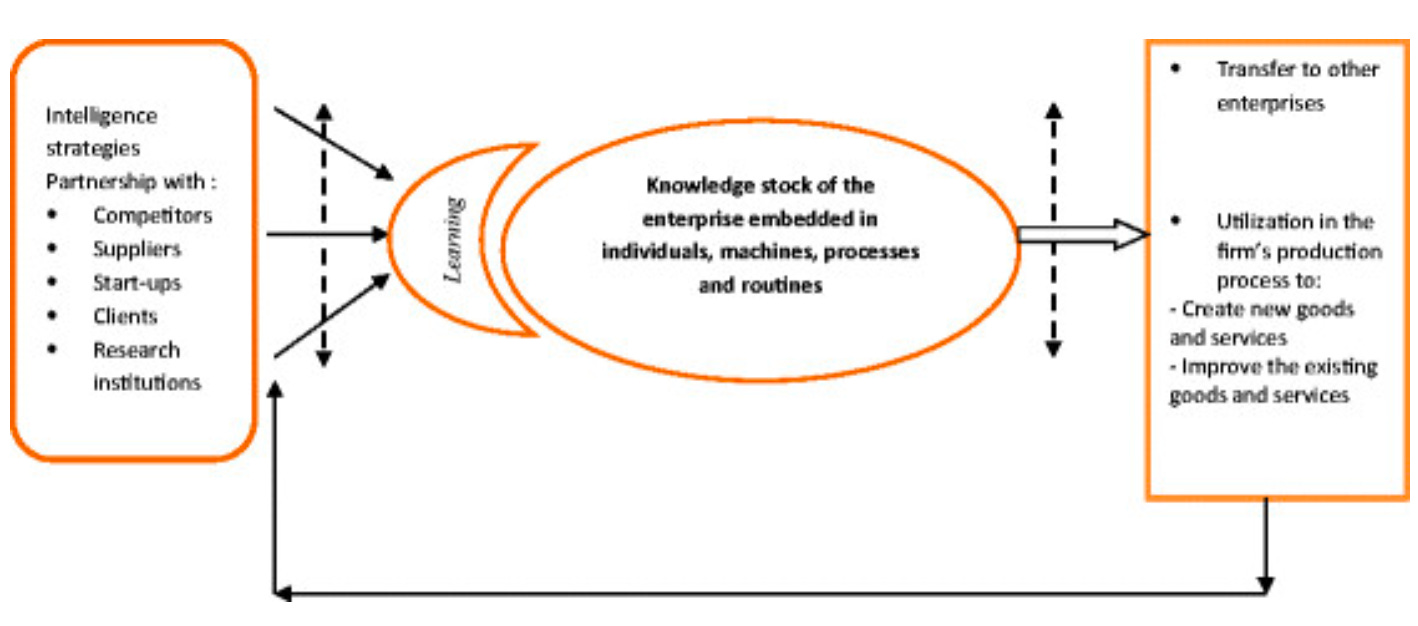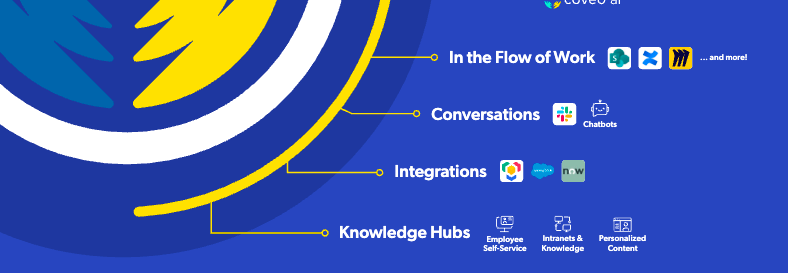🏞️ Knowledge Capital unleashed: Maximizing Enterprise Potential with AI Copilots
Proprietary and specific assistants are going to be the norm: who's building this and why?
👋 Welcome to this week’s edition!
Today we will be covering a deep-dive on:
🤖 Knowledge Capital: the underlookeed value of companies
🧑💼 Intro to enterprise Knowledge Assistants, Copilots, Cobots etc
🌊 Possible evolutions, benefits and risks
🌎 Current solutions and tools
Let’s dive in! 💫
🤖 Enterprise Copilots are coming
In my previous article, The Rise of Co-bots, I introduced how we’re beginning to use AI third party tools (like ChatGPT) as an ‘assistant’. Now, we should be already thinking about how 5 years from now, every company will have its internal, proprietary AI assistant. This is because it will help solve a bunch of pretty big ‘corporate’ problems.
Let’s have a look at what they are, and who are the players already solving this.
🧑💼 Premise: Knowledge Capital vs Revenue Capital
We all tend to reduce companies’ success as how well their products perform on the market, going to even more length by measuring how profitable they are (it doesn’t matter if your product sells like hot cakes, if it it’s not bringing revenue, it doesn’t matter). The mix of venture capital and technological fetishism is seen by the valuation formula of a company, which is usually a multiplier of revenues or EBITDA.
How is that multiplier built?
There’s a lot of factors, but if you had to boil it down to the fundamentals, it’s based on comparables in the market and projections of the revenue run rate. If someone’s invested at 10x the ARR (Annual Recurring Revenue), then there will be an ‘anchor’ around that. We could dwell on this for long, but it’s not the scope of today’s piece.
What I’m trying to get to here, is that to my knoweldge, there is no value attached to the ‘knowledge’ of the company, which could be broken down into:
Value of the people employed - I know it’s ugly, but employees are like any other products on the market. Different skill sets will have different monetary values, but now in any Profit and Loss statement, this is just seen as a cost, necessary to produce the goods.
Value of historical knowledge - What’s the value of an important learning? Of a failed product launch? It’s hard to pin-point, but there sure is a competitive and timing advantage that could results in mid and long term success.
Value of agility - Disruption is inevitable. In today’s economy, it’s happening faster and more often. Take the example of AI, where for the first time, behemoths like Google stated ‘they have no MOAT’ (defensibility of their product on the market). Technology is becoming a commodity, and open source. That’s not to say that those who have more money or connections will not have any competitive advantage, but for the first time, they have some pretty big competition and there’s lower barriers to entry for small, nimble ‘Exponential Organizations’ (those who scale with a fraction of the people and capital) to come and take market share.
This means that the size, and the ‘agility index’ (I just made this up, but you see the point) of a company, has value. Our blindness is in seeing value in more intangible and difficult to measure assets, but if there’s one thing I’ve learnt over the years doing marketing, is that you can always use proxies.
So what?
My goal is not to write a book on Knowledge Capital just now, but to introduce why this is one of the reasons Enterprise AI Assistants will be widespread and may help in bringing out this underrated topic in the world of business.
📊 We need Information
This is the building block, the atom. Here’s how it’s defined:
Information refers to data, facts, or knowledge that is communicated or received, typically through various forms of communication such as speech, writing, images, or digital signals. It is the result of processing and organizing data to make it meaningful and useful to humans. Information can be used for various purposes, including understanding a subject, making decisions, solving problems, or conveying messages.
I would add that ‘Information is a way to create value and can be used to quickly adapt to the external and internal changes in dynamics’.
Now take any organization. How is this information stored?
Speech - A huge portion of employee’s time is spent in meetings. These are speech-based. Historically, 90% of this information gets lost. Some meeting notes may be sent out, but not in all of these meeting. Come 2023, you have a plethora of AI-meeting assistants (think of Otter.ai, Microsoft’s Teams) that will try to capture that information and summarize key topics, action items. Caveat: what about non-virtual meetings? Someone’s already been thinking about that, namely Plaud, who are producing a small gadget that records, transcribes audio from meetings, phone calls and so on. You can see happy people here doing just that:
Images - Think of Powerpoint. Yes, you get company-shared folders, which are meticulously tagged, but how do you make that work when you have thousands tho choose from?
Writing - Email is still Queen in work. Where does all of this information go? Nowhere.
Digital Signals - Employees are people. People work in networks - some are dictated by the company, others are not. What are the most important connections that are being formed? Are there any that work better than others? A branch of Data Science for HR spurred ‘Organizational Network Analysis’ which does just that, but we’ll treat that separately another day.
I could go on for a while longer (and I have, in ‘Datafication of Work’), but I think you can start to see my point.
👨🚀 Why do we need Enterprise AI-Assistants or ‘Copilots’?
Capturing value of information: Even if it won’t be capturing 100% of ‘knoweldge’ capital, this could be a start. By making sure more information is captured, stored and ready to be processed, companies start to extract more of this value.
Research-time and Accuracy of information: According to a McKinsey report, employees can spend up to 20% of their day searching for information, impacting the speed and performance in which they do their jobs. Frustration over sifting through irrelevant information and low confidence about information accuracy is an ongoing problem. This isn’t just frustrating — it’s also a morale killer, creating uncertainty and apprehension around information accuracy.
Privacy: A lot of companies have banned ChatGPT and other AI Chatbots for privacy concerns. You can’t share sensible private information into a public black box, so you need to have a custom-built and owned solution.
Consistency: Right now, it’s the wild-west. Everyone’s using different tools, in different ways. By using one solution, you can ensure that everyone can get the same training, use best practices, but also have the same expectations on results and improvements.
Tool overload - According to Okta’s 2023 Business at Work report, the average (2,000+ employee) company uses 211 apps, up from 195 in 2022, with organizations who rapidly adopt new tools seeing a boost in employee productivity, job satisfaction.
🎢 How are they expected to evolve?
Phase 1: This is the current stage of Knowledge Assistants, where they are mainly used for ideation, writing, or improving written text. These AI models are trained and deployed for straightforward tasks and their interaction with corporate data is minimal or non-existent.
Phase 2: The next phase will be defined by the use of retrieval augmented generation (RAG). In this phase, AI models will have full access to relevant corporate data, functioning much like an interactive chatbot. Users will be able to request them to perform complex tasks such as summarizing reports, identifying top performers, or detailing product sales. Although this phase's deployment may take a few years, it is expected to provide productivity gains multiple times higher than Phase 1 due to its increased capabilities.
Phase 3: In this advanced stage, the Knowledge Assistant will be able to execute tasks on behalf of the worker. This involves intelligent and reliable interaction with enterprise systems, including generating invoices or placing orders. The successful implementation of this phase will require overcoming challenges related to the diversity of enterprise systems and necessary interfaces. Although wide-scale deployment will be slower than Phase 2, certain sectors with high paperwork volumes or where a speech/text interface could enhance worker safety may adopt it earlier. This phase's productivity gains are harder to predict, but they are expected to be significantly higher than Phase 2.
👷 Ok - Who’s building this?
Short-answer: a lot of start-ups. Best answer: Microsoft.
Microsoft has the competitive advantage of the foot-in-the-door of large businesses using their suite, and therefore can provide the highest level of benefit, synergy and seamless integration in their tools. Here’s a video of the launch:
(Longer version is in a Keynote ‘Future of Work with AI’ you can catch here on Youtube)
I have to be honest, some of those functionalities are pretty cool. Being able to fill in emails, powerpoint docs tapping in from excel data and documents, meeting notes - will be quite useful.
It comes at a big price though: currently 30$/month per user on top of the Microsoft 365 Suite.
Who else is building? Here’s a few examples:
Coral, by Cohere - Cohere’s a pretty big player in the AI space, and just launched their Assistant. Still pretty limited though.
Glean - Looks like a more powerful solution, but still based on information retrieval versus actual taking action.
Gerev.ai - This one is focused on developers, which is a smart move (one of the key evolutions of this technology is to be extremely 'use case’ and ‘persona’ specific). The interesting bit is that it can help with specific code answers related to the tech stack and company.
Another interesting feature I saw, was one that taps into the mess of Roles & Responsibilities inside of bigger organizations, and helps answers questions on process and ownership, like for example on who should be doing upselling for a product:
There’s definitely more out there, but the bottom line for me is:
Microsoft can win thanks to its monopoly - Like it has done in many other times in history, it’s difficult to overthrow the king of business applications.
The only alternatives will win on price, or specificity - Not everyone can affort M365 business suite. This is still a big market, and it can definitely target also freelancers. But the real key for me, will be about building extremely vertical use cases, that can be safe for company proprietary data, but that could even tap into other sources and have a solid amount of setup for the specific persona.
❓A final question
I couldn’t help but to mention some obvious, but prickly kind of question: is it OK to have everything that an employee does, or says, completely tracked?
Let me know what you think in the comments 👇













